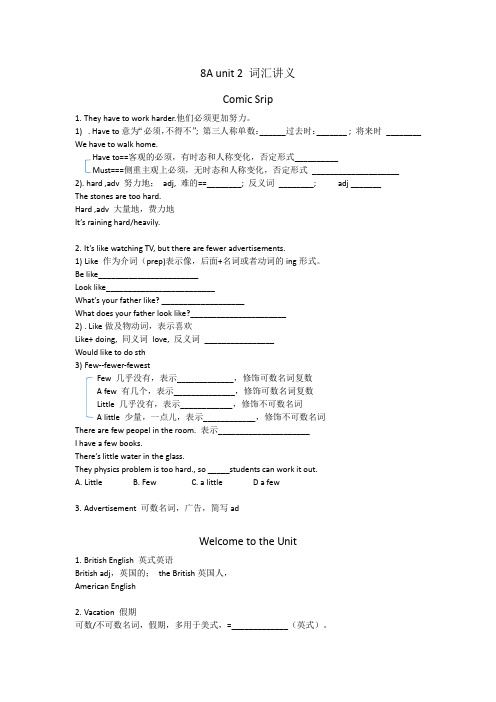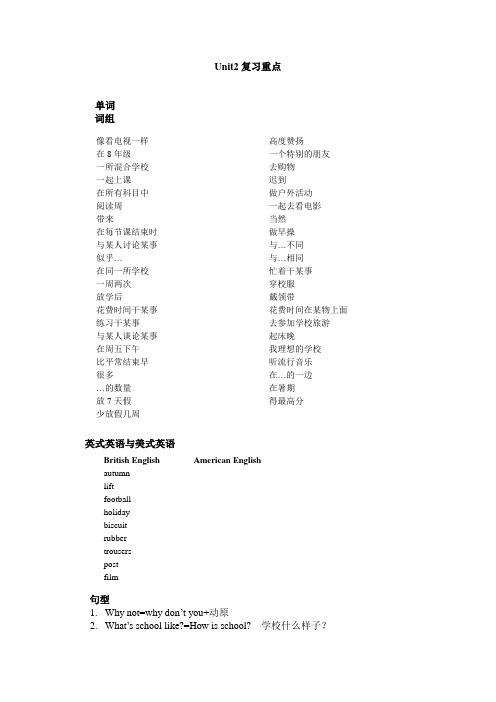牛津译林版 8A Unit2语法精讲
- 格式:docx
- 大小:15.58 KB
- 文档页数:3

牛津译林版英语八上(8A)Unit2Schoollife知识点复习牛津译林版英语八上牛津译林版英语八上((8A )Unit2 School life 知识点知识点复习复习Important phrases and sentences:Welcome to the unit1.Why don ’t sb. do sth.?= Why not do sth.? 为什么不做……?2.work harder. 更加努力3.What ’s school like? It ’s like watching TV . be like doing sth. (like 介词,介词+doing)4.fewer advertisements 更少的广告an advertisement 一则广告few/many advertisements 5.British English/ American English英式英语/美式英语6.have some plans for the weekend 有一些周末计划7.see/watch a film 看电影Reading8.in Year 8 (Year Eight) 名词+基数词(首字母都要大写)= in Grade Eight= in the eighth grade 一般情况下:名词+基数词(首字母都要大写)= the +序数词+名词(首字母小写)eg. Lesson One = the first lesson9.a mixed school. 一所男女生混合的学校10.have lessons together 一起上课11.among all my subjects 在我所有的学科当中12.like French best 最喜欢法语13.Learning foreign languages is fun. 动名词做主语,谓语动词用单数(language 作为语言不可数名词,而具体的语言是可数名词five languages 14.fun n.乐趣;娱乐活动;嬉戏,嬉闹;有趣的事adj.使人愉快的;开心的funny adj.滑稽的,可笑的what (great/good) fun! have fun doing = It is fun to do ... (都不要冠词)15.foreign languages 外语(foreigner n, 外国人)16.a Reading Week 阅读周during the week 在这周期间17.borrow 主语借入lend 主语借出borrow sth. from sb. 向某人借某物(借进)lend sth. to sb. = lend sb sth 把某物借给某人(借出)18.bring in 带来bring in books and magazines from home 从家中带来书和杂志19.near the end of the week临近每周结束时at the end of the street 在街道的尽头20.discuss sth with sb 与某人讨论某事discuss the books with our classmates in class课堂上与同学一起讨论书的内容21.seem to go faster 似乎走得更快seem to do sth. 似乎做某事seem (to be) +adj.It seems that + 从句It seems that he is angry seem angry 似乎很生气eg. He seems(to be) unhappy today.他今天似乎不高兴22.go to the Buddy Club 去同伴俱乐部23.learn more about the school 更多地了解这个学校24.listen carefully to my problems 仔细地倾听我的问题25.offer me help 向我提供帮助offer sb. sth. = offer sth. to sb. 向某人提供某物offer to do sth 主动提出做某事26.end earlier than usual.比往常结束得更早27.do sports together一起做运动28.twice a week 一周两次29.practice hard every time 每次努力练习practice doing sth 练习做某事30.win two games 赢得两场比赛31.an article by a boy from the USA.一篇美国男孩写的文章32.what else = what other things 其他的还有什么Grammar and Integrated skills/doc/65548791.html,e first in the race 在比赛中得第一名34.any other +名词单数= the other +名词复数any other student = the other studentsShe draws better than any other student in my class = She draws better than the other students in my class…的数量(谓语动词用单数形式)35.the number of …The number of the students in our school is about 1500 我们学校学生的数量大约是1500个许多,大量(谓语用复数) A number of students are playing football 许多学生a number of …在踢足球36.do morning exercises 做早操take some exercise “锻炼”不可数,其余都可数37.spend ... on sth. / (in) doing sth. 花费......做某事spend more time doing homework = spend more time on homework花更多的时间做作业spend the least time on homework = spend the least time doing homework花最少的时间做作业38.have (some time )off休息(一段时间)have two weeks off = have a two-week holiday休两周假39.half an hour 半小时three hours and a half= three and a half hours 三个半小时40.half an hour for playing computer games 半小时玩电脑游戏41.another half an hour for playing chess 还有半小时下象棋42.at most 最多,至多at least至少43.do some reading/cooking/shopping/cleaning 阅读/做饭/ 购物/ 打扫44.two hours for sports 两小时体育活动among the four of us 我们四个人中45.far—farther/ further---farthest/ furthest 但表示程度深时只能用further further study 深造Study skills and Task46.have an English test 进行一次英语测试47.have a monthly test on each subject举行各科月考48.look through 浏览look through the questions quickly快速浏览问题49.read English newspapers and magazines 读英语报刊和杂志at first 首先,起初50.keep writing in English about my daily life不断地用英语写关于我的日常生活51.learn to use English better 学会更好地使用英语52.watch English videos 观看英语录像53.have a lovely time 玩得很愉快54.my ideal school 我理想的学校(adj)55.finish school 毕业56.need to get up early 需要早起57.have lots of time for after-school activities 有许多时间进行课外活动58.half an hour of homework 半个小时的作业have an hour for lunch 有一小时午餐(时间)59.a big clean dining hall 一个大而清洁的餐厅60.wear uniforms 穿校服wear ties 系领带61.choose subjects to study 选择学科来学习62.a football field 足球场 a swimming pool 游泳池63.go on a school trip 进行一次学校旅行64.have fun = have a lovely/good/nice/great/wonderful time 玩得愉快语法A.比较事物的数量1.many (修饰可数名词)/much (修饰不可数名词)----more ----most比…..数量多.more + 可数名词复数/ 不可数名词+ than ...…Eg;I have more friends than you.2.few (修饰可数名词) -----fewer----fewestlittle (修饰不可数名词)----less-----leastfewer +可数名词复数+ than ……比…..数量少There are fewer boys than girls in our class.less + 不可数名词+than ……比…..数量少I spend less money on food than my sister.3.the fewest +可数名词复数在….中最少He has the fewest books.4.the least +不可数名词在….中最少She has the least money of us.5. the most + 可数名词复数/ 不可数名词最多Daniel has the most money.B.副词的比较级和最高级1.一般在词尾直接加er或est,例如,hard-harder-hardestfast-faster-fasterestLoud-louder-loudest2、部分双音节词和多音节词分别在原级前加more构成比较级和most构成最高级,例如:Slowly-more slowly-most slowlyClearly-more clearly-most clearly Carefully-more carefully-most carefully 3、副词比较级和最高级的不规则变化well-better-bestbadly-worse-worst。

牛津译林版8AU2知识点讲解1.知识目标:学生能够掌握U2的短语和词汇。
2.技能目标:学生能够掌握U2单词的用法。
3.情感目标:学生能够学会自己学会安排学校的活动。
Comic&Welcome to the unit知识点01.why don’t...?用法【用法详解】含义:为什么不.......?,通常表示建议和责备,相当于why not+动词原形例:1.why don’t dogs go to school?为什么狗不用上学?2.Why don’t you play basketball with me?=why not play basketball with me?为什么不和我一起打篮球呢?【典例讲解】1.翻译:为什么不在你生日开个派对呢?(两种译法)__________________________________________________________________________________________________________________________2.-------Are you going to try out for the host of the English party?-------______?It is such a good chance to improve my spoken English.A.what’s upB.What’s wrongC.Why meD.Why not知识点02.have to用法【用法详解】1.have to do sth,意思为不得不做某事,含有因为外界原因而造成的结果的色彩。
2.must do sth,意思为必须,表示人主观上的看法,是主观上的必须。
例:1.Because we are cleverer than people,they have to work harder.因为我们比人聪明,他们不得不工作更努力。

牛津译林版八年级上8AUnit2知识点梳理8A Unit2 知识点解析与练习1. life n. 生活 (表示总称抽象概念时为不可数名词 school life ,表示具体的不同生活时为可数名词 : different lives)生命可数名词 : The police saved our lives.2. Why don 't + you + 动词原形 = Why not + 动词原形为什么不做某事呢?表建议 Eg. Why don 'tyou ask your teachers for help? = Why not ask your teachers for help? 为什么不向你老师寻求帮助呢 ?3. They have to work harder.1) have to do sth. 不得不做某事客观外在情况(否定: don ' t/doesn ' t/didn 't have to do) must do sth. 必须做某事主观内在原因2) work harder 更努力工作 /学习此处 work 是动词 , hard 是副词hard work 辛苦的工作此处hard 是形容词,work 是不可数名词hard-workingadj.He drove fast in the street because there werepeople.for the same thing 表达同一事物的不同单词6. different words be different from … 与… 不同 be the samea s …be different from = be not the same as7. Britain n.英国 British adj.英国的 & n.英国人America n.美国 American adj.美国的 & n.美国人France n.法国French adj.法国的& n.法语life in a British/ American school = school life inBritain/America8. buy a toy lorry for my cousin in the shop near our school1) buy 三单 _________ 过去式 ______________buy sb. sth. = buy sth. for sb. 为某人买某物2) a toy lorry 一个玩具货车 two toy lorr ies 两个玩具货车3) in the shop near our school 在我们学校附近的商店 near our school 是shop 的后置定语9. Do you have any plans for the weekend? 你周末有什么计划吗? plan n. make a plan for 为……制定计划make future plans = make plans for the future v.plan (not) to do sth. 计划做某事 plan ned10. 1). practice sth. 练习某事 practice doing sth. practice hard on sth 努力练习… work hard on sth.2) this Saturday this 前不加介词11. an important match 比赛: match/matches形容词勤奋的,努力工作的困难的= difficult 反义词easy/simple 硬的反义词 soft 努力地 adv. worker but Susan works even than her.Kate is a 4. What 's school like? = How is school? 学校是什么样子?like vt. 喜欢 prep. 像 Simon, _____ his father,5. There are fewer advertisements.1) advertisement 广告可数名词2) few/little 几乎没有 , 表示否定含义 There is little water in the fridge. Let 's buy some. a few/ a little 一些表示肯定。

8A unit 2 词汇讲义Comic Srip1.They have to work harder.他们必须更加努力。
1). Have to意为“必须,不得不”; 第三人称单数:______过去时:_______ ; 将来时________ We have to walk home.Have to==客观的必须,有时态和人称变化,否定形式__________Must===侧重主观上必须,无时态和人称变化,否定形式____________________ 2). hard ,adv 努力地;adj, 难的==________; 反义词________; adj _______The stones are too hard.Hard ,adv 大量地,费力地It’s raining hard/heavily.2.It’s like watching TV, but there are fewer advertisements.1)Like 作为介词(prep)表示像,后面+名词或者动词的ing形式。
Be like_______________________Look like_________________________What’s your father like? ___________________What does your father look like?______________________2). Like做及物动词,表示喜欢Like+ doing, 同义词love, 反义词________________Would like to do sth3)Few--fewer-fewestFew 几乎没有,表示_____________,修饰可数名词复数A few 有几个,表示______________,修饰可数名词复数Little 几乎没有,表示____________,修饰不可数名词A little 少量,一点儿,表示____________,修饰不可数名词There are few peopel in the room. 表示_____________________I have a few books.There’s little water in the glass.They physics problem is too hard., so _____students can work it out.A.LittleB. FewC. a little D a few3.Advertisement 可数名词,广告,简写adWelcome to the Unit1.British English 英式英语British adj,英国的;the British英国人,American English2.Vacation 假期可数/不可数名词,假期,多用于美式,=_____________(英式)。

牛津译林版8A Unit 2 知识点复习【ic strip & Wele to the unit】1.Why don’t... “为什么不……?”Why don’t + 主语+ 动词原形+ 其他?= Why not + 动词原形?2.have to “不得不”have to do sth. “不得不做某事”have to 有时态和数的变化,强调客观上必须做某事。
don’t have to “不必”。
must 没有时态语态的变化,强调主观上的必要。
mustn’t “禁止”。
3.few/a few/little/a littlefew:“很少,几乎没有”,修饰可数名词复数,表示否定。
a few:“一些,几个”,修饰可数名词复数,表示肯定。
little:“不多,几乎没有”,修饰不可数名词,表示否定。
a little:“一些,少量”,修饰不可数名词,表示肯定。
4.practise “练习”practise doing sth. “练习做某事”【Reading】5.动名词做主语,谓语动词用第三人称单数形式。
6.borrow/lend/keepborrow:“借入”。
borrow sth. from sb./sp. “从某人/某处借某物”lend:“借出”。
lend sb. sth. = lend sth. to sb. “把某物借给某人”(不能与表示一段时间的状语连用)keep:表示借了某物一段时间,与表示一段时间的状语连用7.near the end of “接近……结束时”in the end “最后”at the end of “在……的尽头”by the end of “到……结束时”8.discuss “讨论,议论”discuss sth. with sb. “和某人讨论某事”discuss doing sth. “讨论做某事”discussion n.“讨论”have a discussion “讨论一下”9.seem “似乎”Sb. + seem(s) + (to be) + 表语“某人似乎……”seem to do sth. “好像做某事”Sb. + seem(s) + 不定式= It seems that sb... “某人似乎……”10.offer “主动提出”offer to do sth. “主动提出做某事”offer sb. sth. = offer sth. to sb. “愿意给某人提供某物”provide sb. with sth. = provide sth. for sb. “给某人提供某物”11.playplay + 球类名词play + the + 乐器名词12.win/beatwin “赢得,获胜”(宾语通常是奖品、奖学金等)(won; won; winning)winner “获胜者”beat “打败”(后接比赛、竞争中的对手)(beat; beaten)【Grammar】13.little “很少(几乎没有)”比较级:less;最高级:leastmuch “许多”比较级:more 最高级:mostless than “少于”at least “至少”at most “至多”14.free “空闲的,有空的”“自由的”“免费的”in one’s free/spare time “在某人的空闲时间里”for free “免费”15.fast /quicklyfast:adj.“快的”;adv.“快地”。

Unit2复习重点单词词组句型1.Why not=why don’t you+动原2.What’s school like?=How is school? 学校什么样子?区分:What is he like?他的性格怎么样?(也可回答外貌,一般强调性格)What does he look like? 他长得怎么样?(回答外貌)What does he like? 他喜欢什么?3.It’s like watching TV. 它就像看电视。
这里的like不再是动词喜欢,而是介词,意思为“像…”后跟名词,代词,动词ing形式。
be like sb 像某人Lucy’ father likes her because she ________her father.4.I spend a lot of time practicing playing baseball.四个“花费”:spend 主语是人,spend+时间(in)doing sth spend+时间/金钱on +名词/代词pay 主语是人, pay+金钱+for+sthtake 主语通常为形式主语it,It takes/took sb +时间+to do sth.花费某人多长时间干某事。
但有时主语可以是人:My father took five days to put the shelf on the wall.cost 主语是物The book costs me ten yuan .=I pay ten yuan for the book..=I spend ten yuan on the book..4.Learning foreign languages is fun.学习外语很有趣。
动词ing 放在句首强调整件事情作主语,谓语动词常用单数。
Eg. Plating trees is important.5.Time seems to go faster. 时间看起来过得更快。
8A U2【welcome】1.have to &must[have to]:“必须,不得不”,强调客观上的需要,有人称,时态的变化(三单has to,过去式had to,将来时will have to),其否定形式为don't/doesn’t/didn’t have to,表示“不必”[must]:“必须”,强调主观意愿和看法,无人称,时态和数的变化,其否定形式为mustn't,表示“禁止,不允许”2.It's like watching TV,but there are fewer advertisements.它(上学)就像看电视,只不过广告少一些。
①like prep.像... +名词/代词/v-ing②few-fewer +可名复③few ;a few;little;a little区别3.British n.英国人the British=British people=Englishmanadj.英国的British people4.vacation 可数名词/不可数名词“假期”(英:holiday)on vacation在度假take a vacation度假winter/summer vacation寒假/暑假5.fall n秋天(英:Autumn);瀑布vi.落下;跌倒6.movie n.(可数) 电影(英:film)go to a movie/go to the movie看电影6.Shall we go together?“Shall we do......?”提建议的句型➡肯定回答:Why not?/OK./Of course./All right.【提建议的句型】Let’s do sth.You'd better do sth.(你最好做某事)How/What about doing sth?Why not do sth?Why don’t you do sth?Will/Would/Could you please do sth?(请你做下某事好吗?)7.practise vi/vt. 练习,训练practise (doing) sth (英:practise)n.练习(英:practice)【reading】1.in year 8在八年级(英:in Grade 8)在...年级:美in Year +基数词in the +序数词+year英in Grade +基数词in the+序数词+grade2.mix vt.混合➡mixed adj.混合的➡mixture n.混合物3.Among all my subjects,I like French best.①like...best=favourite②France n.法国➡French ①n.法语②adj法国的Frenchman法国人4.Learning foreign language is fun.①learning foreign language 动名词短语,起名词作用(指学外语这件事),后面的谓语动词用单数。
8A Unit 2 School life【短语学习重点】P.22-261. why don’t you …=why not…?为什么不……?2. It’s like watching TV.像看电视一样。
3. speak English in both Britain and in America在英国和美国都讲英语a British school --- an American school4. different 不同的单词be different from….tell the differences between A&B find out the differences between A&B5. in Year 8/Grade 8 /in 8th grade 在8年级6. a mixed school 一所混合制学校7. how to cook and sew 如何做饭和缝纫8. I did not know how to do things for myself.= how I can do things for myself9. my favourite subject 我最喜爱的学科10.Home Economics家政学11.cook healthy and tasty meals做健康可口的饭菜12.have a reading week有一个阅读周13. any book 任何书14. bring in sth from home从家里带来某物15. have to do sth 不得不做某事16. near the end of sth /at the end of sth 在---将要/---结束的时候17. talk to/with sb about sth 就某事和某人交谈18. as well也19. have driving lessons in school 上学校开设的驾驶课程20. drive me to school 开车送我去学校drive sb to sp开车送某人去某地21. last year 去年22. twice a week 两周一次once/twice a month一月一次/两次23. spend a lot of time practicing 花大量时间实践与---谈论practice playing softball练习打垒球24. in the Buddy Club 在一个伙伴俱乐部25. learn about 获悉、了解26. have a great time talking度过一段愉快的交谈时间27. a close friend一个亲密的朋友28.with a pleasant taste具有怡人的口味29.tell me more about…告诉我更多有关……talk to sb. about sth跟某人谈论某事30.in 9th grade 在九年级31. read an article by a girl from the USA 看了一篇来自女孩写的文章32. a special friend 一个特别的朋友33. admire sb. very much 非常羡慕某人34. read magazines 看杂志P.27-3135. computer studies电脑学习36. tell funny jokes讲有趣的笑话37. read stories 看小说38. score the most points 得分最高39. plant trees 植树40. the three of us 我们三人41.all the students 所有学生42.a glass of water 一杯水43. online friends 网友44.the same as 和…一样45.different from 和……不同P.32-3746. have 3 days off放三天假47.wear school uniforms 穿校服48.have three Computer Studies lessons 有三节电脑课49.have three Grade 8 classes 有三个8年级班级50.hurt one’s leg 伤了某人的腿51.look out of the window朝窗外看52. move to …搬到…..53.school uniform 校服54. go on a school trip to someplace到…进行一次学校旅行55. join a club加入一个俱乐部56.a big dinning hall 一个大餐厅after-school activities课外活动57.listen to pop music 听流行音乐listen to good music58. on one side…..on the other side在一边….在另一边59. (be) the same size as...和----有相同的尺寸【句型学习】1.Why don’t dogs go to school? 狗为什么不去上学?2.What is school like? It is like watching TV. 学校像什么样子呢?它就像看电视。
8A U2语法精讲
【基础知识】
1. 如何比较数量的多少
①两者之间数量上的比较:
(1)用”more…than…”结构表示“……比……多”,more后接可数名词复数或不可数名词。
(2)用“fewer/less…than…”结构表示“……比……少”,fewer后接可数名词复数,less后接不可数名词。
②三者或三者以上的数量上的比较:
(1)用the most表示“最多”,most后接可数名词复数或不可数名词。
(2)用the fewest/least表示“最少”, fewest后接可数名词复数,least后接不可数名词。
2.走进副词:副词的分类
1.时间副词:时间副词是确定句子时态的重要标志,所以一定要牢固掌握不同时态的时间标志。
2.地点副词:地点副词和动词连用时不同加介词。
3.方式副词:(quickly,happily,loudly,suddenly,luckily,badly,easily,fast)
4.程度副词(very,quite,rather,too,much,so)
5.疑问副词
6.关系副词(when where why)
7.频率副词
3. 副词比较级和最高级的构成:
(1)规则变化:
比较级:
A.单音节,在词尾加-er,fast-faster, hard-harder, loud-louder
B.以字母e结尾的副词,加-r,late-later
C.以辅音字母+y结尾的副词,先变y为i,再加-er,early-earlier
D.部分双音节副词和多音节副词,前面加more,carefully-more carefully, politely-more
politely
最高级:
最高级也一样,只是将-er换成-est,more换成most而已。
(2)不规则变化:
well-better-best badly-worse-worst far-farther-farthest
4.副词比较级的用法:
A+…副词的比较级+than B.当than前后使用的动词相同时,通常用do的某种形式代替后面的动词,该词可以省略。
5.副词最高级的用法:
(1)“主语+实义动词+(the)+副词最高级+in/of短语”表示“……得最……的”
I jump (the) farthest in my class. 我是我们班跳得最远的。
(2)“特殊疑问句+实义动词+(the)+副词最高级+甲,乙,丙?”用于三者(以上)的比较。
Who runs (the) fastest, Tom, Mary or Kate? 谁跑的最快,汤姆、玛丽还是凯特?。